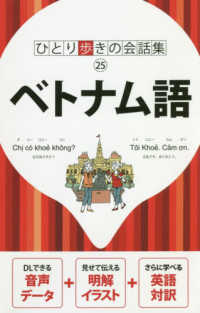- ホーム
- > 洋書
- > 英文書
- > Politics / International Relations
基本説明
Building on a highly successful special issue of the leading journal World Politics. Contributors include G. John Ikenberry, Michael Mastanduno, William C. Wohlforth, Martha Finnemore, Stephen M. Walt, Jack Snyder, Robert Y. Shapiro, et al.
Full Description
The end of the Cold War and subsequent dissolution of the Soviet Union resulted in a new unipolar international system that presented fresh challenges to international relations theory. Since the Enlightenment, scholars have speculated that patterns of cooperation and conflict might be systematically related to the manner in which power is distributed among states. Most of what we know about this relationship, however, is based on European experiences between the seventeenth and twentieth centuries, when five or more powerful states dominated international relations, and the latter twentieth century, when two superpowers did so. Building on a highly successful special issue of the leading journal World Politics, this book seeks to determine whether what we think we know about power and patterns of state behaviour applies to the current 'unipolar' setting and, if not, how core theoretical propositions about interstate interactions need to be revised.
Contents
1. Introduction: unipolarity, state behavior, and systemic consequences G. John Ikenberry, Michael Mastanduno and William C. Wohlforth; 2. Unipolarity, status competition, and great power war William C. Wohlforth; 3. Legitimacy, hypocrisy, and the social structure of unipolarity: why being a unipole isn't all it's cracked up to be Martha Finnemore; 4. Alliances in a unipolar world Stephen M. Walt; 5. System maker and privilege taker: U.S. power and the international political economy Michael Mastanduno; 6. Free hand abroad, divide and rule at home Jack Snyder, Robert Y. Shapiro and Yaeli Bloch-Elkon; 7. The liberal sources of American unipolarity G. John Ikenberry; 8. Unipolarity: a structural perspective Robert Jervis; 9. Unipolarity and nuclear weapons Daniel Deudney; 10. From unipolarity to multipolarity: transition in sight? Barry R. Posen; 11. Sell unipolarity? The future of an overvalued concept Jeffrey W. Legro.








